Highlights from Year 1 of Europlanet 2024 RI
Europlanet 2024 RI is one year old this week. Despite the pandemic, there has been a great deal of activity and progress over the past twelve months. The project is on track in its work to support the planetary community and provide state-of-the-art access to services and facilities for research in planetary science and related fields.
Transnational Access | Virtual Access | Networking Activities | Management
VESPA | SPIDER | GMAP | ML | NA1 | NA2
Transnational Access (TA)
A core part of the work of a research infrastructure is to provide free, cross-border access for researchers to planetary analogue field sites, simulation and analysis facilities. Two calls for applications for Transnational Access (TA) were issued in Year 1 of the project and, despite Covid-19 restrictions, the first visits have started to take place.
The suite of field sites and laboratories offered by Europlanet 2024 RI now numbers over 40 and has been expanded in Call 2 to include 11 laboratories in South Korea. Call 3 will include further facilities in China and Korea, plus field sites in the Argentinian Andes.
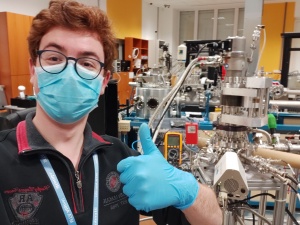
Call 1, which closed on 5 May 2020, received 80 applications, of which 41 were funded. Despite the ongoing travel restrictions due to Covid-19, applications for Call 2, which closed on 6 January 2021, rose by 25% to a total of 101 submissions. The successful Call 2 applications will be announced by the end of March.To date, three TA visits have taken place, including a virtual and an in-person visit to the Atomki Ice Chamber for Astrophysics/Astrochemistry (ICA) facility in Hungary and a virtual visit to Cold Surfaces Spectroscopy laboratory at IPAG in France. Some of the TA applicants have shared their experiences of submitting a successful TA proposal in a recorded webinar.
TA Development
Six of the TA facilities are being upgraded as part of the Europlanet 2024 RI project and the first of these projects has been completed.
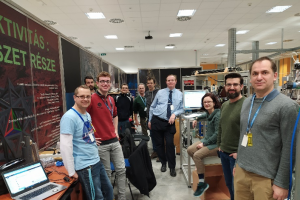
In early 2020, an existing ultra-high vacuum chamber (provided by Queen’s University Belfast) was shipped to Debrecen in Hungary and installed at the beamline of Atomki’s 2MV Tandetron accelerator. The chamber has been upgraded with ultraviolet/visible and mass spectroscopy extensions that will optimise it for studying the effects of ion irradiation on a variety of different ice surface analogues. These upgrades will support research to improve our understanding of the physical and chemical processes in the Solar System. The augmented facility was operational in time to be included in the first TA call in May 2020, and the first two visits have already taken place. Find out more about the upgrades to the facility.
Virtual Access
SPIDER
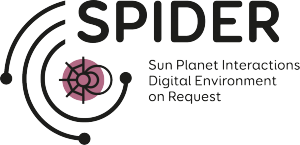
SPIDER (Sun-Planet Interactions Digital Environment on Request) is providing access to six services for modelling planetary environments and solar wind interactions through a run on request infrastructure and associated databases. The SPIDER Virtual Access (VA) activity extends the twelve planetary space weather services developed through the previous Europlanet 2020 RI project (2015-2019).
In the first year of Europlanet 2024 RI, the first two SPIDER services have been prototyped and made operational:
- A Mercury exosphere run on request service
- A planetary plasma instrument background counts database and service.
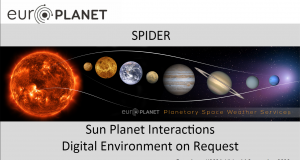
Predictions of the solar wind parameters propagated to BepiColombo, Solar Orbiter and the Parker Solar Probe have been added to the Heliopropa service and to the Automated Multi-Dataset Analysis (AMDA) tool.
SPIDER services have also been utilised during the Bepicolombo Venus flyby in October 2020 and will be used again for the first Mercury flyby in 2021.
Simulations of Mercury’s magnetosphere using the operational SPIDER service have been performed, analysed and accepted for peer-reviewed publication in the journal Planetary and Space Science (Cross-comparison of global simulation models applied to Mercury’s dayside magnetosphere, Aizawa et al, 27 January 2021). The SPIDER project and results were presented in a session on planetary space weather at the Europlanet Science Congress (EPSC) 2020.
VESPA
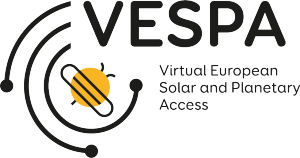
VESPA (Virtual European Solar and Planetary Access) is a network of interoperable data services covering all fields of Solar System Sciences. It is a mature project, developed within previous Europlanet projects and already connects 55 services.
During Year 1 of the Europlanet 2024 RI project, planned workshops to integrate new data services into VESPA have been put on hold due to the pandemic. However, additional services have been published from legacy Horizon 2020 programmes, including Small Bodies Near and Far (SBNAF), and large infrastructures, such as eCallisto, a network of space weather radio observatories.
The Planetary Virtual Observatory and Laboratory (PVOL) service for amateur images has grown by 15% this year and now exceeds 50,000 entries.
The impact of VESPA has been significantly extended through collaborations with data infrastructures and international consortia. Representing VESPA, Europlanet Society has joined the International Planetary Data Alliance (IPDA) alongside national and international space agencies. The VESPA access protocol, EPN-TAP, is in a final validation stage by the IPDA and the International Virtual Observatory Alliance (IVOA).
VESPA Development
During the first year of the project, VESPA has set up various communication tools and started the study of new infrastructure elements.
Key milestones include:
- The run-on-demand platform, OPUS, developed through the H2020 ESCAPE programme, has now been installed for VESPA. ESA is currently testing applications for the JUICE mission with Callisto flyby sequences.
- Test data services are being installed on the European Open Science Cloud (EOSC) through the VESPA-Cloud pilot activity, with support from eduTEAMS/GÉANT and EGI to identify a standard installation procedure on the cloud.
- New versions of existing display and analysis tools have been released with extended support for VESPA data services and EPN-TAP.
- The SSHADE spectroscopy infrastructure has been enlarged to support multi-angular data and band lists.
GMAP
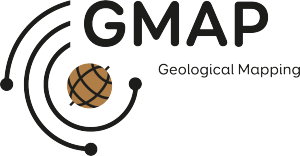
GMAP (Geologic MApping of Planetary bodies) integrates partners and outputs from two projects previously funded by the EU through Horizon 2020 (UPWARDS and PLANMAP) to deliver tools and services for geological mapping of any Solar System body. The infrastructure created through GMAP will support future European missions in developing orbital acquisition strategies, rover deployment and traverses, and human exploration programmes.
In Year 1 of the Europlanet 2024 RI project, information and data access components for GMAP service provision have been set up, for both internal and external user communities, and new collaborations have been established around the world.
GMAP Development (Joint Research Activities)
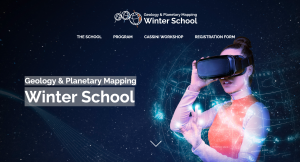
The first step in building a community of GMAP VA mappers has been through a Planetary Mapping Winter School, co-organised by GMAP and PLANMAP. This Winter School was over-subscribed, and the registration was closed two weeks early after 200 participants signed up from around the world. The Winter School took place from 1-5 February 2021, with 130 participating in the live hands-on programme and a further 70 following activities via the OpenPlanetary portal. The programme has included lectures and practical experience in creating planetary geological maps, with instructors including high-profile experts from the planetary mapping community across Europe. Promotion of the event was supported through the Europlanet Society and the Europlanet Early Career (EPEC) network. It is anticipated that many of the participants will form part of the community of planetary geological mappers that will support the development of GMAP.
The Winter School has also put in place an overall architecture and dedicated web-domain for future training schools, which will serve as core events to publicise GMAP activities during the years to come. The school will also be a source of recorded material for the future promotion of GMAP activities.
GMAP development activities have also resulted in Chinese partners successfully obtaining funding through the Chinese Ministry of Science and Technology (MOST). The funding of 3,160,000 RMB (~400,000 Euros) has been awarded to the ‘Key Technologies and Demonstration of Standardised Planetary Geologic Mapping’ project led by Prof Zhizhong Kang of the China University of Geosciences, Beijing (CUGB), which runs from 1st December 2020 until 30th November 2023.
Machine Learning Solutions for Data Analysis and Exploitation in Planetary Sciences
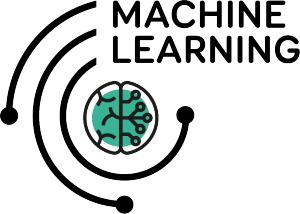
The Machine Learning activity in Europlanet 2024 RI aims to foster wider use of machine learning technologies in planetary research, and to develop open-source machine learning tools for specific science cases.
At the end of the first year of Europlanet 2024 RI, the Machine Learning activity is progressing work on four science cases. These include:
- The automatic identification and classification of interplanetary coronal mass ejections in in-situ solar wind data, with the aim of improving early detection and ultimately forecasting.
- The automatic identification of magnetopause/bow shock crossings on Mercury through MESSENGER data, with the aim of improving our understanding of Mercury’s magnetosphere and its dynamics.
- The development of a generalised machine learning pipeline for the localisation and characterisation of specific geomorphological features (mounds) that are present on the surface of Mars (science case in collaboration with GMAP).
- The application of a deep learning object detection algorithm to detect pit craters on the surface of Mars from images obtained by the HiRISE instrument onboard the Mars Reconnaissance Orbiter (science case in collaboration with GMAP).
The first three science cases above will be completed in February and March 2021.
A Europlanet Machine Learning Portal has been launched and serves as a public access point for the services. A public GitHub has also been set up, where codes and scripts are available for the scientific community. The first results of the science cases were presented at EPSC2020 as well as at the European Space Weather Week.
Networking Activities (NA)
Community Support, Dissemination and Engagement with Stakeholders (NA1)

The Community Support, Dissemination and Engagement with Stakeholders Networking Activity aims to foster co-operation and to extend the user base of Europlanet 2024 RI’s facilities and services. Activities are focused around specific audiences (industry, under-represented states, early careers, the media, policy-makers and educators) and goals (widening participation, global collaboration, expert exchange and outreach).
Highlights from networking activities in Year 1 of Europlanet 2024 RI include:
- Holding EPSC2020 as a successful virtual meeting with 1168 participants from 67 countries (the largest stand-alone EPSC to date).
- A high-level Industry and Policy session at EPSC2020 that included participation by three Members of the European Parliament (MEPs), a representative of the Commission, and representatives of academia and industry.
- A training workshop on how to write a successful proposal for the Europlanet 2024 RI Transnational Access (TA) programme
- The delivery of the Global Collaboration and Integration Development Strategy 2020-2024.
- The launch of a pilot TA programme for European and Korean researchers to have reciprocal access each other’s facilities.
- The launch of the Europlanet Early Careers Training and Education Portal and a pilot Mentoring Programme involving 10 pairs of mentors and mentees.
- The launch of an internship programme for early career researchers to develop social media and communications skills.
- The award of funding to four high-quality outreach projects, following the highest number of applications to date for the Europlanet Outreach Funding Scheme.
- Provision of virtual training to outreach and education providers
- Completion of seven educational resources related to Mars and Europlanet 2024 RI planetary field analogue sites.
- Distribution of 11 Planets in a Room (PIAR) spherical projector kits to outreach providers around Europe.
- The establishment of a not-for-profit German enterprise company with charitable objectives, FTP-Europlanet gUG, as a first step in ensuring long-term sustainability of Europlanet education and outreach activities.
Coordination of Ground-based Observations (NA2)
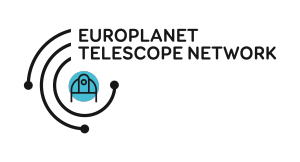
The Coordination of Ground-based Observations Networking Activity (NA2) is a network of small telescope facilities and supporting the integration of amateur astronomers into planetary sciences.
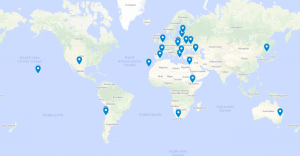
The Europlanet Telescope Network, launched in June 2020, currently links 16 facilities located around the globe that range from 0.25 – 2m in diameter. At present, 14 out of 16 of the observatories can provide remote observations, enabling the network to operate despite Covid-19 travel restrictions.
To date, seven applications have been received, with four projects being awarded funding and three projects under consideration. The first observations started in January 2021. All four successfully-funded projects to date are led by female scientists from an under-represented state and cover the following topics:
- Reducing the selection effects in asteroid spins, shapes, and thermal parameters (application for seven nights at Moletai Astronomical Observatory, Lithuania). Project led by A Marciniak, Poland.
- Characterisation of V-type asteroids outside the dynamical Vesta family (application for eight nights at Chuguev Observatory, Ukraine). Project led by D Oszkiewicz, Poland.
- Precise asteroid volumes from Gaia and ground-based observations I (application for six nights at Tartu Observatory, Estonia). Project led by M Polinska, Poland.
- Precise asteroid volumes from Gaia and ground-based observations II (application for five nights at Observatorio del Teide, Spain). Project led by M Polinska, Poland.
NA2 is also harnessing the amateur community through observational campaigns on planetary topics. In Year 1 of Europlanet 2024 RI, six observational alerts were issued through PVOL database, and these were followed by over 200 active observers. The observations related to two of the alerts (March 31: Storm Activity on Saturn’s North Polar Region and May 31: Jupiter Storm in the South Temperate Belt) have contributed to two research papers that are being submitted for publication by researchers at UPV/EHU.
Management
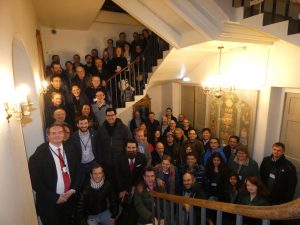
With over 50 beneficiaries, Europlanet 2024 RI is one of the most complex distributed research infrastructures funded by the European Commission to date. Over 60 members of the Europlanet 2024 RI Consortium gathered in Windsor on 27th and 28th February for the formal launch of the project, just before full lockdowns were implemented in most countries around the world.
Over Year 1 of the project, the Management Team has administered the project and provided management and financial oversight, ensuring that progress is on track for project deliverables, milestones and budgets. The Europlanet 2024 RI structures and committees (including the Steering Committee, the Project Management Committee and the Project Advisory Board) have been set up and supported in their roles, and reporting procedures and record management systems have been devised and implemented in accordance with the project Grant Agreement and European Union standards.
The Management Team has communicated news and updates to project beneficiaries and the wider community, and has implemented actions, including the distribution of the grant amongst the beneficiaries. Outcomes of a successful Council meeting, held virtually in October, culminated in the submission of a Grant Amendment to the European Commission to adapt to changes in project objectives in light of the pandemic, as well as adding new beneficiaries and expanding the suite of TA facilities.
Back to Europlanet 2024 RI Main Page

